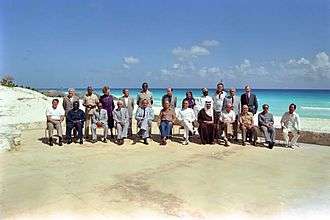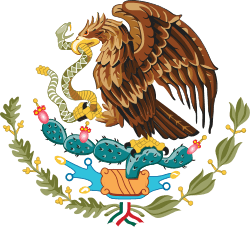Mexico–Venezuela relations
 |
|
Mexico |
Venezuela |
|---|---|
Mexico–Venezuela relations are foreign relations between Mexico and Venezuela. Both nations are members of the Association of Caribbean States, Community of Latin American and Caribbean States, Latin American Integration Association, Organization of American States, Organization of Ibero-American States and the United Nations.
History
Both Mexico and Venezuela share a common history in the fact that both nations were once part of the Spanish Empire. During the Spanish colonial period, Mexico was then known as Viceroyalty of New Spain and the capital being Mexico City while Venezuela was governed from the Viceroyalty of New Granada in Bogotá. In 1810; both Mexico and Venezuela declared their independence from Spain with each nation obtaining independence in 1821 and 1830, respectively. Soon after obtaining independence, Emperor Agustín de Iturbide of Mexico contacted President Simón Bolívar by informing him of his ascension to the Mexican throne and telling him of his personal admiration for Bolivar after learning about his heroic valor and successful military campaigns.[1]
In 1842, both nations accredited ambassadors to each other's countries. Mexico's ambassador to Venezuela was stationed in Bogotá, Colombia while Venezuela's ambassador to Mexico was stationed in Washington, DC, United States. In 1916, Mexico sent its first resident ambassador to be based in Caracas; however, diplomatic relations became tense in 1922 since Venezuela had not at that point established a resident ambassador to Mexico. In 1922, Mexico, under protest, closed its embassy in Caracas. In September 1923, Mexico broke diplomatic relations with Venezuela after the country had denied entry of Mexican nationals arriving to the country to partake in cultural activities being held in Venezuela. Diplomatic relations would be re-established ten years later in June 1933.[2]
During the 1940s, diplomatic relations normalized between the two nations and resident ambassadors were appointed to each nations capitals, respectively. In 1946, President Rómulo Betancourt was the first Venezuelan head of state to pay an official visit to Mexico. In January 1960, President Adolfo López Mateos was the first Mexican head of state to visit Venezuela while on a trip to South America. Since the initial visits, there have been several high level visits between the two nations.[2]
Since then, relations between the two nations have been friendly. In 1995, Mexico and Venezuela, along with Colombia; signed a free trade agreement; however, Venezuela pulled out of the agreement in 2006. Recent involvement in the oil industry by both countries, as well as Mexico joining the North American Free Trade Association in 1994, has led to various disputes between the two nations. During Mexican President Vicente Fox's term from 2000-2006; ties between the two countries became critically strained. In November 2005, the cooperation between Fox and the United States on the stalled Free Trade Area of the Americas proposal at the Fourth Summit of the Americas brought relations to a boiling point.[3]
The late Venezuelan President Hugo Chavez, stated in a speech on 10 November 2005 to supporters in Caracas that he was saddened that "the president of a people like the Mexicans lets himself become the puppy dog of the empire", as well as appearing on his weekly talk show Aló Presidente three days later, where he stated that the Mexican president was "bleeding from his wounds" and warned Fox to not "mess" with him, lest Fox "get stung".[3][4] Mexico's demand of an apology was unanswered by the Venezuelan government, and both countries pulled their respective ambassadors within two days of the talk show statement, starting the 2005 Mexico and Venezuela diplomatic crisis.[5][6]
In August 2007, after two years of diplomatic absence in either country, normal relations were re-established with the appointment of former foreign minister Roy Chaderton as Venezuela's envoy in Mexico City and the transfer of Jesús Mario Chacón Carrillo, formerly Mexican ambassador to Colombia, to Caracas.[7]
After the election of President Nicolás Maduro in April 2013, the Mexican government has further emphasized the close ties between the two countries and the willingness to overcome differences in terms of political structures and relations with the US.[8]
In January 2015, President Maduro accused Felipe Calderon of plotting with opposition to kill him and to topple his government. Maduro accused Calderon of having ties with drug cartels. [9]
Drug trafficking
Venezuela has been a path to the United States for illegal drugs originating in Colombia, through Central America and Mexico and Caribbean countries.
There have been several instances of Mexican registered planes carrying cocaine being shot down by the Venezuelan government.[10][11] In April 2015, a wrecked plane was carrying nearly a ton of cocaine and was registered with the official fleet of Mexico’s Attorney General’s Office.[12][13]
State visits

Presidential visits from Mexico to Venezuela[2][14][15][16][17][18][19]
- President Adolfo López Mateos (1960)
- President Luis Echeverría (1974)
- President Miguel de la Madrid Hurtado (1984)
- President Carlos Salinas de Gortari (1989, 1990, 1992)
- President Ernesto Zedillo (1997, 1998)
- President Vicente Fox (2001)
- President Felipe Calderón (2011)
- President Enrique Peña Nieto (2013)
Presidential visits from Venezuela to Mexico[20][21][22][23][24]
- President Rómulo Betancourt (1946, 1963)
- President Carlos Andrés Pérez (1975, 1991)
- President Luis Herrera Campins (April & October 1981)
- President Jaime Lusinchi (1986, 1987)
- President Rafael Caldera (1997)
- President Hugo Chávez (2002, 2004, 2010)
Trade
In 2014, two-way trade between both nations amounted to $1.6 billion USD.[25] Mexico's main exports to Venezuela include: maize, baby food, shampoo, paper and machinery while Venezuela's main exports to Mexico include: machinery for making steel, building materials and sesame seeds.[25]
Resident diplomatic missions
- Mexico has an embassy in Caracas.[26]
- Venezuela has an embassy in Mexico City.[27]
See also
References
- ↑ Iturbide y Bolívar: documentos-memorias (in Spanish)
- 1 2 3 History of diplomatic relations between Mexico and Venezuela (in Spanish)
- 1 2 "Chavez blasts Mexico over summit". BBC. Retrieved January 12, 2013.
- ↑ "Mexico demands Venezuela apology". BBC. Retrieved January 12, 2013.
- ↑ "Chavez renews trade pact attack". BBC. Retrieved January 12, 2013.
- ↑ McKinley, James. "Mexico and Venezuela break off relations". New York Times. Retrieved 7 January 2013.
- ↑ Aviles, Karina. "Jesús Mario Chacón, propuesto por México para embajador en Venezuela". La Jornada. Retrieved 7 January 2013.
- ↑ Mexico congratulates Maduro on win. Radio, The voice of Russia (TASS), April 16, 2013.
- ↑ http://www.telesurtv.net/english/news/Maduro-Says-Mexican-Ex-President-Has-Ties-with-Drug-Cartels--20150124-0010.html
- ↑ http://www.latimes.com/world/worldnow/la-fg-wn-downed-plane-in-venezuela-draws-questions-from-mexico-20131107-story.html
- ↑ http://www.ibtimes.com/venezuela-plane-takedowns-highlight-latin-americas-aerial-drug-war-1751721
- ↑ http://venezuelanalysis.com/news/11318
- ↑ http://www.abc.net.au/news/2015-04-09/cocaine-and-former-mexican-officials-id-found-at-crash-site/6381962
- ↑ Viaje del presidente De la Madrid por América Latina (in Spanish)
- ↑ Presidente Carlos Salinas de Gortari, realizo una visita a Venezuela (in Spanish)
- ↑ Giras y Visitas Internacionales del C. Presidente de la República (in Spanish)
- ↑ Viajes realizados al extranjero por el C. Felipe Calderón (in Spanish)
- ↑ Viajes realizados al extranjero por el ciudadano Vicente Fox Quesada (in Spanish)
- ↑ Sin interés político la visita a Venezuela, fue por solidaridad: Peña (in Spanish)
- ↑ President Carlos Pérez visits Mexico (in Spanish)
- ↑ Visitas de mandatarios sudamericanos a México (in Spanish)
- ↑ Visita del Presidente de la República de Venezuela Rafael Caldera a México (in Spanish)
- ↑ President Hugo Chavez attends the Monterrey Consensus Conference in Monterrey, Mexico; 2002 (in Spanish)
- ↑ México-Chávez, una relación de altibajos comerciales y diplomáticos (in Spanish)
- 1 2 Mexican Ministry of the Economy: Venezuela (in Spanish)
- ↑ Embassy of Mexico in Caracas (in Spanish)
- ↑ Embassy of Venezuela in Mexico City (in Spanish)
